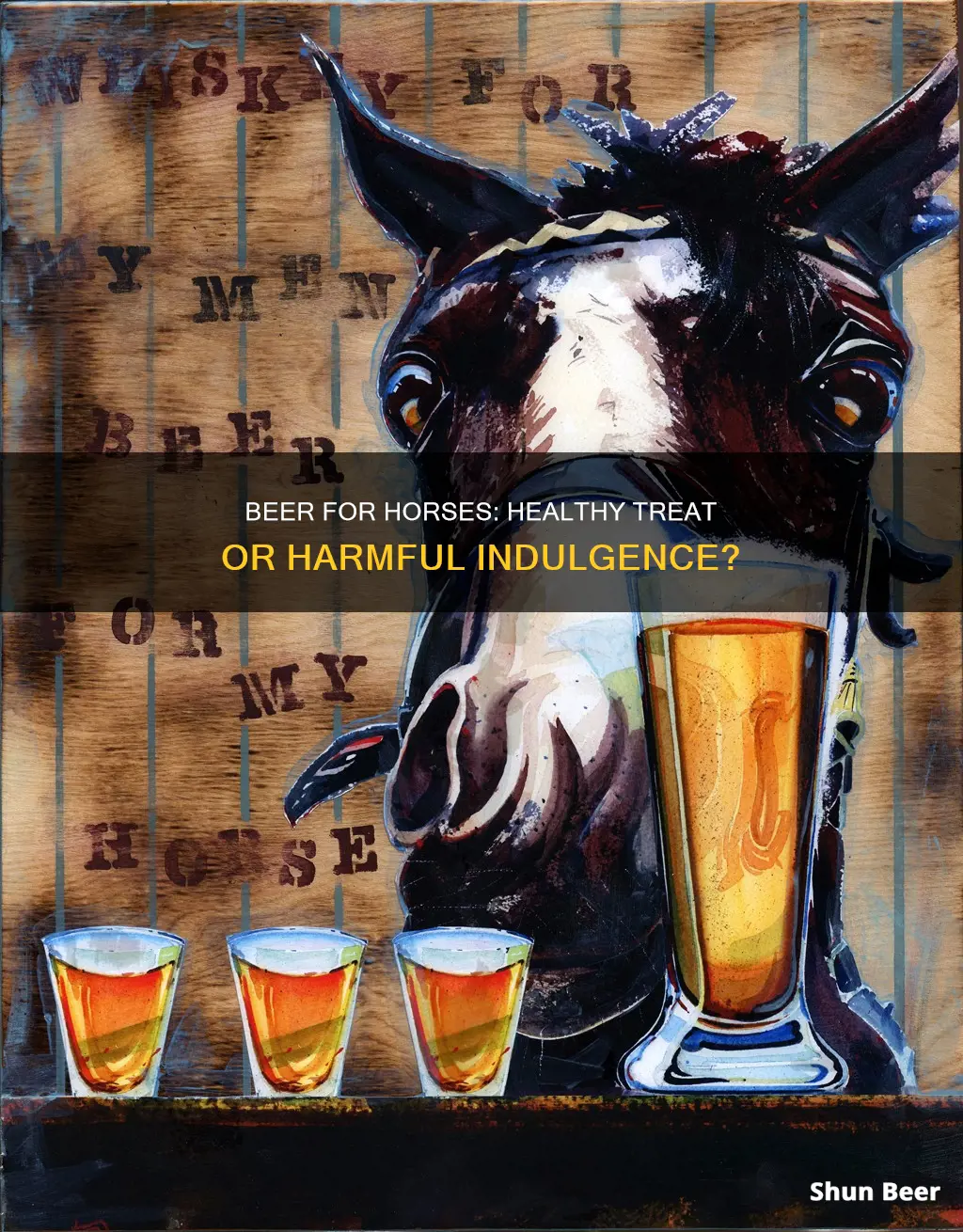
Beer for horses? It turns out that giving horses beer has been a practice among equestrians for many years, especially racehorse trainers. But is it healthy? While there is no scientific evidence, some believe that beer can help treat certain medical conditions, act as a gastrointestinal supplement, and aid post-workout recovery. Beer is also believed to be a good source of B vitamins, carbohydrates, iron, and vitamins, which can help muscle recovery from strenuous exercise. However, it's important to note that too much beer could lead to potential adverse side effects like weight gain and an upset stomach. So, while an occasional beer may be fine, it's always best to consult with a veterinarian before giving anything new to your horse.
What You'll Learn

Beer can help horses with anhidrosis (the inability to sweat)
Anhidrosis is a potentially life-threatening condition in horses that live in hot, humid climates. Horses with anhidrosis are unable to sweat properly, which can lead to overheating, heat stroke, organ failure, and even death. Sweating is the predominant method for horses to cool themselves, so when they are unable to do so, exercise or high heat and humidity can result in dangerous consequences.
Although there is no scientifically proven treatment for anhidrosis, it is a long-standing tradition for horsemen to give their horses beer, particularly Guinness stout beer, as a remedy. The recommended amount is one beer a day, mixed in with their feed or water, or poured into a bucket for the horse to drink. While there is no scientific evidence that beer cures anhidrosis, there is also no known harm in giving your horse a beer a day, and there is the potential to treat this severe disease.
Beer is thought to help with anhidrosis because it is a source of yeast and B vitamins. Strains of the yeast found in beer, Saccharomyces cerevisiae, are often found in equine pre- and probiotics. Yeast is thought to help stabilize the equine hindgut and may be useful in medical cases of colitis. It may also be used as a supplement to promote a healthy gut.
The B vitamins in beer are vital for the correct functioning of metabolic pathways. The eight B vitamins (thiamin, riboflavin, niacin, pantothenic acid, biotin, folic acid, B6, and B12) are involved in everything from building blood cells and maintaining nerve cells to generating cellular energy and metabolism of fats, carbohydrates, and proteins. They are also important for maintaining healthy skin and a shiny coat.
In addition to the potential health benefits of beer for horses with anhidrosis, it is also a good source of carbohydrates, iron, and vitamins that can aid in muscle recovery after strenuous exercise.
Mead vs Beer: Which Is Healthier?
You may want to see also

It is a good source of B vitamins
Beer is a good source of B vitamins, which are essential for the body's metabolism to function properly and generate energy. B vitamins also help the body maintain healthy skin and hair. The eight B vitamins (thiamin, riboflavin, niacin, pantothenic acid, biotin, folic acid, B6, and B12) are involved in everything from building blood cells to maintaining nerve cells, generating cellular energy, and metabolising fats, carbohydrates, and proteins.
Yeast, a vital component of beer-making, is a single-celled fungus that consumes sugars from the hops and barley in the beer. During this process, it produces carbon dioxide and alcohol. One of the strains used to make beer, Saccharomyces cerevisiae, is also used to formulate equine probiotics, which help stabilise the equine hindgut and may be useful in medical cases of colitis. It may also be used as a supplement to promote a healthy gut.
Malted barley, another ingredient in beer, is also a good source of B vitamins. Additionally, the water used to brew Guinness beer comes from springs in the Wicklow Mountains in Ireland, and the beer is then imported to the US.
It is worth noting that while beer is a good source of B vitamins, it is not the best source when compared to whole foods like fruits and vegetables. The B vitamins in beer can also be cancelled out by the alcohol content.
Porter Beers: Healthy or Unhealthy?
You may want to see also

It can be used as a post-workout recovery drink
Beer is often used as a post-workout recovery drink for horses, with many racehorse trainers giving their horses a beer after a race or workout. The primary hypothesis behind this practice is that the carbohydrates, iron, vitamins, and B vitamins in beer can aid in muscle recovery from strenuous exercise. Additionally, the yeast in beer may provide probiotic support for the horse's digestive system.
The tradition of giving horses beer, particularly Guinness stout beer, is well-established in the equestrian community, especially among racehorse trainers. While there is limited scientific evidence to support the practice, many believe that the nutritional content of beer can be beneficial for horses.
It is important to note that the effectiveness of beer as a post-workout recovery drink for horses is still being researched. Some sources suggest that the potential benefits may be outweighed by the cost, as a bag of carrots may be a more cost-effective way to provide similar nutritional benefits.
When considering giving beer to a horse, it is essential to do so in moderation. Most vets recommend no more than one beer a day for a horse, as excessive consumption could potentially lead to adverse effects on the digestive system. Additionally, it is important to ensure that the beer is at room temperature and opened for several hours to remove the carbonation before serving it to the horse.
While the practice of giving horses beer is generally considered safe, it is always advisable to consult with a veterinarian before introducing any new substance into a horse's diet.
Bloody Mary vs Beer: Which Booze is Healthier?
You may want to see also

It can be used as a gastrointestinal supplement
Beer has been used as a gastrointestinal supplement for horses for many years, especially for racehorses. The practice is so common that it has become a tradition among equestrians, with famous horses like Tapit and Zenyatta known to enjoy a Guinness occasionally.
The primary reason for using beer as a gastrointestinal supplement is its rich source of B vitamins, which are essential for the proper functioning of metabolic pathways. The eight B vitamins, namely thiamin, riboflavin, niacin, pantothenic acid, biotin, folic acid, B6, and B12, play a crucial role in various physiological processes. These include building blood cells, maintaining nerve cells, generating cellular energy, and metabolising fats, carbohydrates, and proteins. B vitamins also contribute to maintaining healthy skin and a shiny coat in horses.
In addition to B vitamins, the yeast in beer, specifically Saccharomyces cerevisiae, is also beneficial for gastrointestinal health. This strain of yeast is used in formulating equine probiotics and has been shown to stabilise the equine hindgut. It may be useful in treating medical cases of colitis and promoting a healthy gut.
Furthermore, the hops in beer, which are the flower part of the hop plant (Humulus lupulus), have been investigated by researchers at the University of Kentucky for their potential to control gastrointestinal imbalances and help prevent pasture laminitis. Hops have a long history of use as a digestive aid in Traditional Chinese Medicine and were recommended by ancient Greek and Roman physicians for intestinal ailments.
While the potential gastrointestinal benefits of beer for horses are promising, it is important to note that most commercial beers are filtered and pasteurised, which removes the helpful live yeast. Additionally, the high sugar content and potential toxicity of alcohol in beer can outweigh any benefits. Therefore, it is recommended to consult with a veterinarian and monitor the horse's tolerance when considering beer as a gastrointestinal supplement.
Beer and Kidney Health: Exploring the Connection
You may want to see also

It can be used as an occasional treat
It is generally considered safe for horses to consume beer, and it can be used as an occasional treat. While there is no scientific evidence to support the practice, some owners give their horses beer as a traditional treatment for anhidrosis (a condition where horses struggle to sweat properly, which can lead to overheating and have dangerous consequences). The idea is that the yeast and B vitamins in beer can help alleviate this condition. However, it is important to note that there is no proven treatment for anhidrosis, and the best way to help a horse with this condition is to move them to a cooler environment.
Beer is also believed to be a good source of carbohydrates, iron, and vitamins, which can aid muscle recovery after strenuous exercise. Additionally, the yeast in beer may help stabilize the equine hindgut and may be useful in medical cases of colitis.
It is worth noting that most commercial beers are filtered and pasteurized, which removes the helpful live yeast. Therefore, if you are considering giving your horse beer for its potential health benefits, an unfiltered and unpasteurized beer would be a better option. However, it is always recommended to consult a veterinarian before introducing anything new to your horse's diet.
While beer can be given as an occasional treat, it is important to do so in moderation. One to two beers a week is generally considered acceptable, with no more than one beer per day. Too much beer could potentially cause adverse effects such as weight gain and gastrointestinal upset. Additionally, it is important to ensure that your horse has access to fresh, clean water at all times, as beer should not replace their regular water intake.
It is also worth noting that while beer is generally safe for horses, some individuals may have allergies or reactions to certain ingredients. Therefore, it is always a good idea to introduce any new substance in small amounts and monitor your horse's reaction.
Beer vs. Soda: Which Is the Lesser Evil, Dr. Mercola?
You may want to see also
Frequently asked questions
Yes, beer can be healthy for horses when given in moderation. It is a good source of B vitamins, carbohydrates, iron, and vitamins, which can aid in muscle recovery after strenuous exercise. Additionally, the yeast in beer may help stabilize the equine hindgut and promote a healthy gut.
Most vets recommend no more than one beer per day for a horse. Excessive beer consumption could potentially lead to adverse effects such as weight gain and gastrointestinal issues.
Beer is often used as a traditional treatment for anhidrosis, a condition where horses struggle to sweat properly, which can lead to overheating and dangerous health consequences. The yeast and B vitamins in beer are believed to help alleviate this condition. Additionally, the taste of beer may encourage hydration in horses, which is particularly useful during cold winter days or hot, humid weather.







